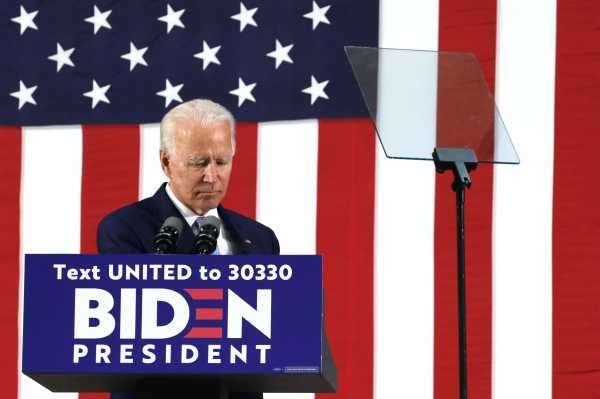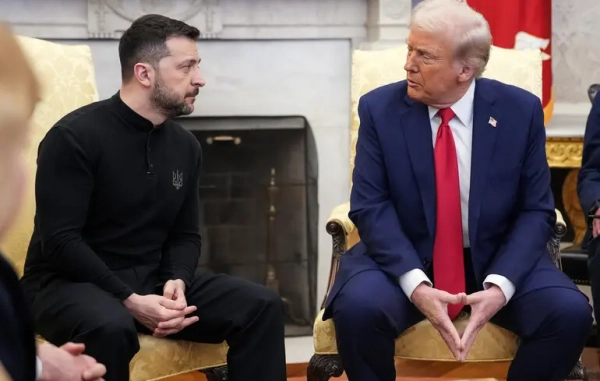
Joe Biden’s message on Covid-19 is simple: “It did not have to be this way.”
That is arguably the theme of Biden’s entire presidential campaign. But it is especially relevant to health care, where the coronavirus response and the conservative crusade to overturn Obamacare combine to demonstrate the vivid contrast between the president we have and the president Joe Biden promises to be.
It is a distinction Biden sounded eager to draw as I listened to the speech he gave Tuesday in Wilmington, Delaware.
“Month after month, as other leaders in other countries took the necessary steps to get the virus under control, Donald Trump failed us,” Biden said. “Month after month, as many of us urged him to step up and do his job, he failed us.”
How Biden’s proposed coronavirus response differs from Trump’s actual record
In his speech, Biden listed all the times he had urged decisive action on the coronavirus pandemic while President Trump downplayed the threat or diverted his attention to anything other than taking the necessary steps to contain the outbreak.
“Just look at the record,” Biden said.
In January, Biden says, he was sounding the alarm about the coronavirus while Trump assured Americans the pandemic was “totally under control.”
In February, Biden says he demanded full
Biden has pushed for more investment in testing and for using the authority of the Defense Production Act to ramp up manufacturing of protective gear; Trump has often demurred on those initiatives and, these days, complains that too much testing has led to a higher number of confirmed cases, which makes him look bad.
Biden’s story has a lot of truth in it. Trump was slow to acknowledge the full scope of the threat, and today he discusses the country’s deadliest disease outbreak this century as little as possible. He did have kind words for Chinese leaders in the early days. He has been reluctant to exploit the executive powers available to him to ramp up testing, increase production of protective gear, and coordinate a national response.
On safely reopening, on contact tracing, on encouraging mask-wearing, on centering science over politics, Biden contrasted what he has proposed and what Trump has done.
And, as Biden put it, “the numbers don’t lie.” More than 125,000 Americans are dead. Infection rates, after slowing during the months of lockdown, are on the rise across the country in red and blue states alike.
“The statewide lockdowns that so many Americans lived under for months were intended to buy us the time to get our act together,” Biden said. “But instead of using that time to prepare ourselves, Donald Trump squandered it.”
I asked some experts how Biden’s proposed Covid-19 response differs from what the current federal government has done. They pointed to a few specific provisions in his plans:
- Establishing a public-private “pandemic testing board” to scale up and allocate testing across the country. (“This would deal with one of the problems we still seem to have, that supply and demand are out of sync,” says Jennifer Kates with the Kaiser Family Foundation.)
- Creating a state and local government emergency fund that would pay for medical supplies, hiring more health care workers, and providing overtime pay for certain essential workers.
- Eliminating cost-sharing for Covid-19 testing and treatment — and changing the law so that provision would apply to future public health emergencies.
- Setting minimum standards for the number of testing sites in each state, including 10 mobile or drive-through sites.
- Establishing a national public health jobs corps, which would employ at least 100,000 people to do contact tracing.
Biden’s plan is detailed, but the real differences on coronavirus between him and Trump start at the more conceptual level.
“The big differences are the emphasis on science and experts, versus politics and politicians, and more coordination and leadership at the federal level,” Kates said.
Some of these items — contact tracing specifically — have been more or less ignored by the Trump administration, even though public health experts say it is necessary to safely relax social distancing. Contact tracers can identify new clusters and potentially prevent wider outbreaks. But as NPR reported, right now most states do not have enough people to perform that job.
“Contact tracing has been mostly ignored at the federal level, and states have been left to prioritize as they see fit,” Joshua Michaud at the Kaiser Family Foundation said. “Which means that some have done more and others have done much less.”
That is indicative of the Trump administration’s overall approach: hands off. Biden is promising much more aggressive federal intervention.
“In general, the administration has pushed decision-making and responsibility almost entirely to the state and local levels on testing, tracing, etc.,” Kates told me. “While some of this reflects our federal system and how public health generally functions in the US, this certainly is not the ideal approach in a true public health emergency.”
Trump is trying to repeal Obamacare during Covid-19. Biden wants to expand it.
If those differences in emergency preparedness and pandemic response weren’t clear enough, the Trump administration also filed a brief to the US Supreme Court last week arguing all of the Affordable Care Act should be overturned. It is Obamacare repeal by another means, after the White House and congressional Republicans failed in 2017.
Whether or not Trump’s SCOTUS gambit succeeds, his administration has been working in myriad ways to undermine Obamacare and its protections for preexisting conditions. Biden, as you may recall from before the bad times, ran in the Democratic primary on expanding the ACA to include, among other things, a new public option.
Trump’s deregulation agenda, the subject of a new investigative series from Vox and the Center for Public Integrity, has given health insurers free rein in the middle of a pandemic to sell plans that don’t cover preexisting medical conditions and don’t provide comprehensive financial protection. More and more Americans are signing up for insurance thinking they are getting a good deal on the price, only to find out, when they go to use it, that it doesn’t cover as much as they thought it did.
Take the story of Ashley Lawley, from my story on Trump’s deregulation of short-term limited-duration health insurance:
There are plenty of other stories like these. I spoke with a lymphoma patient who ended up with $800,000 in hospital bills after his short-term plan had decided his cancer was a preexisting condition because he had been treated by a chiropractor for back pain before signing up. A Florida man was charged $3,000 by his short-term plan for a flu test — which he took while he worried he actually had Covid-19 — and then started scouring his old medical records to figure out if that was a preexisting condition.
There might be some legitimate reasons people want a short-term plan, but what Trump has really done is set up a parallel, deregulated health insurance market to compete with the ACA. He’s permitted short-term plans to last for a full year (Obama had limited them to 90 days), and customers can renew their short-term plan up to three times.
During the coronavirus pandemic, experts are worried because this market is rife with misleading marketing if not outright fraud (as alleged in Lawley’s lawsuit), and right now, millions of people have lost their health insurance and might be shopping for a new plan.
As covered in my story, if they search online for health insurance, they are more likely to end up on a third-party website selling short-term plans right alongside ACA-compliant insurance. If they speak with a broker, they are too often misled about the benefits a short-term plan would provide. Researchers at Brookings conducted secret-shopping trials to ask about Covid-19 benefits specifically and found a staggering amount of misinformation.
“I was shocked by the amount of misinformation we encountered,” Christen Linke Young, who led the project, said. “They were totally dishonest about the nature of the coverage.”
To borrow Biden’s words from his Covid-19 remarks: It didn’t have to be this way. In March, he called these short-term plans “junk” and promised he would reverse the sabotage of Obamacare overseen by his opponent.
“During a public health emergency that could touch anyone, anywhere, Americans deserve a government that strives to expand access to health care and ensure the best possible care,” the former veep said. “They don’t want or need junk.”
This story appears in VoxCare, a newsletter from Vox on the latest twists and turns in America’s health care debate. Sign up to get VoxCare in your inbox along with more health care stats and news.
vox-mark
Sign up for the
newsletter
VoxCare
Email (required)
By signing up, you agree to our Privacy Notice and European users agree to the data transfer policy.
For more newsletters, check out our newsletters page.
Subscribe
Support Vox’s explanatory journalism
Every day at Vox, we aim to answer your most important questions and provide you, and our audience around the world, with information that has the power to save lives. Our mission has never been more vital than it is in this moment: to empower you through understanding. Vox’s work is reaching more people than ever, but our distinctive brand of explanatory journalism takes resources — particularly during a pandemic and an economic downturn. Your financial contribution will not constitute a donation, but it will enable our staff to continue to offer free articles, videos, and podcasts at the quality and volume that this moment requires. Please consider making a contribution to Vox today.
Sourse: vox.com






